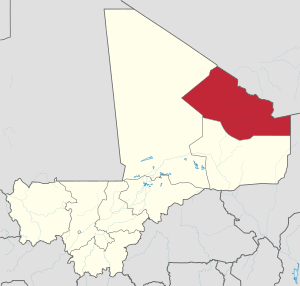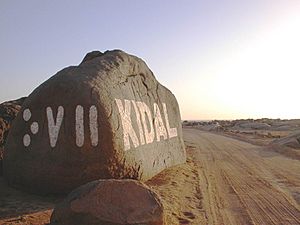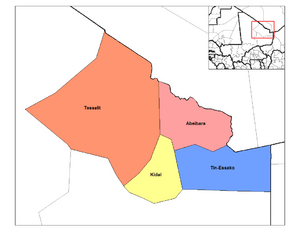Kidal Region facts for kids
Quick facts for kids
Kidal Region
|
|
|---|---|
|
Region
|
|

Location within Mali
|
|
| Country | |
| Capital | Kidal |
| Area | |
| • Total | 151,450 km2 (58,480 sq mi) |
| Population
(2009 census)
|
|
| • Total | 67,638 |
| • Density | 0.446603/km2 (1.15670/sq mi) |
The Kidal Region is a large area in the northern part of Mali, a country in Africa. It covers about 151,450 square kilometers, which is a very big space. This region used to be part of the Gao Region. But it became its own separate region in 1991. The main city and capital of the Kidal Region is Kidal.
In 2012, a group called the National Movement for the Liberation of Azawad said this area was an independent country called Azawad. However, no other country or international group recognized this claim. Different armed groups controlled the region until January 2013. Then, French forces helped to free the area.
Contents
Where is Kidal Region?
The Kidal Region is located in the northern part of Mali. It shares borders with several places. To the west, it borders the Tomboctou Region. To the south, it borders the Gao Region. To the east, it borders the country of Niger. And to the north, it borders Algeria.
The region has a desert climate. This means it is very hot and dry. Daytime temperatures can reach as high as 45°C (113°F). The largest towns in the region are Kidal, Tessalit, and Aguel'hoc.
Who Lives in Kidal Region?
The people who live in the Kidal Region are mostly Tuaregs. Tuaregs are a nomadic group of people. They are of Berber origin. Their unique writing system is called the Tifinagh alphabet.
Being nomadic means they often move from place to place. This lifestyle works best in the region's difficult desert environment. However, some permanent settlements have grown in Kidal. These include Kidal, Aguel'hoc, Tessalit, and Tinzawatène.
How People Live and Work
The main ways people make a living in Kidal Region are raising animals, making crafts, and trading goods. Some commercial farming has also started in certain areas.
The region is very isolated. There are no paved highways for easy travel. Also, there are no rivers that can be used for transportation. This makes it hard to get around and connect with other places.
How Kidal Region is Governed
The Kidal Region is divided into 4 main areas called cercles. These cercles then contain 11 smaller areas called municipalities.
The 4 cercles are:
- Abéibara
- Kidal
- Tin-Essako
- Tessalit
See also
 In Spanish: Región de Kidal para niños
In Spanish: Región de Kidal para niños
 | Victor J. Glover |
 | Yvonne Cagle |
 | Jeanette Epps |
 | Bernard A. Harris Jr. |



